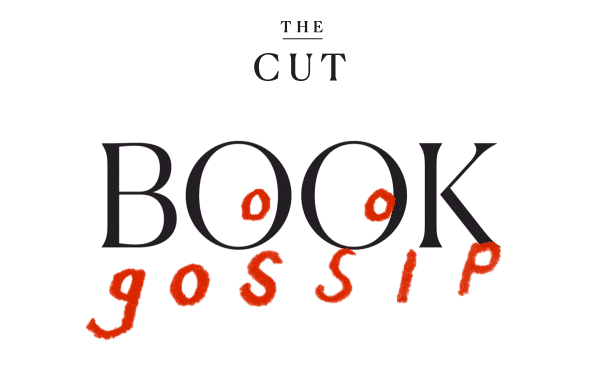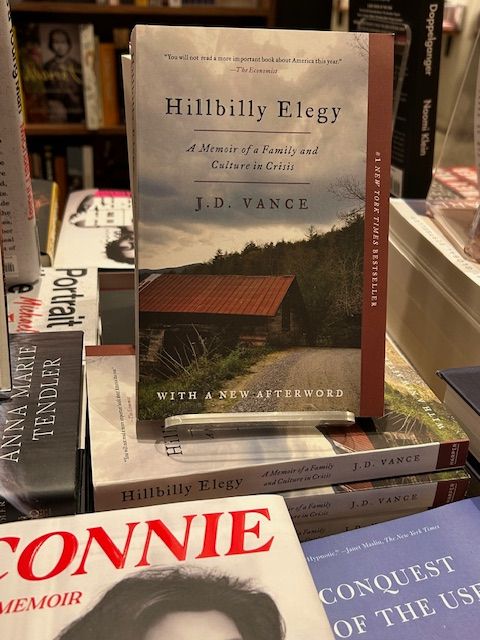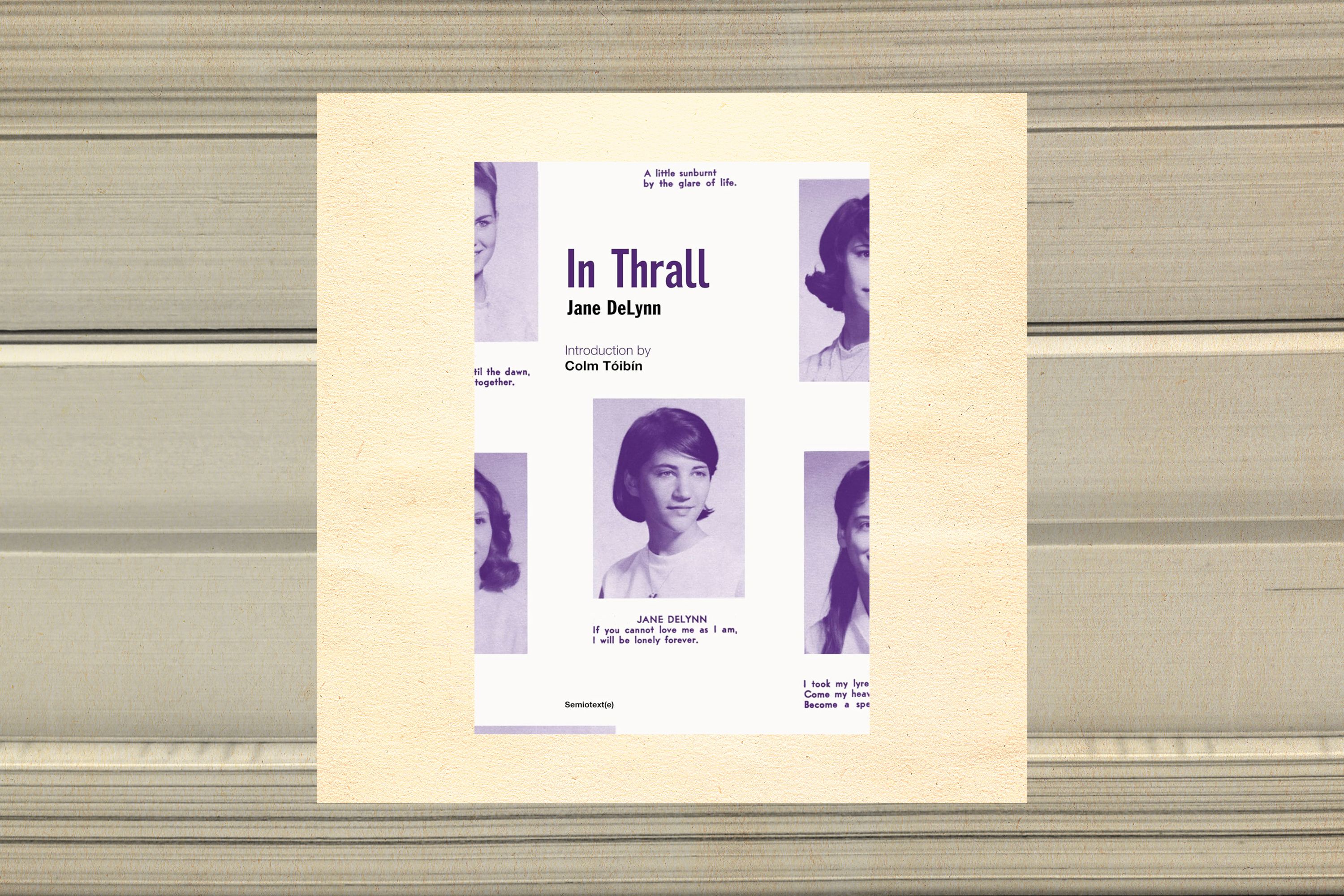This month: How the publishing industry is feeling post-election, a sexy re-release to take you back to a time when it was totally okay to have a lesbian awakening via your high-school teacher, the author Substacks we actually read, and an award for Miranda July that’s just as important as the National Book Award. |
|
|
| Features writer, New York |
|
|
Are We Going to Get More Escapism, More Tell-Alls, or More Dystopian Fiction? We asked people in the publishing world about what they’re going to do for the next four years. |
A bookseller at the McNally Jackson in Soho told me they’re seeing more sales of Hillbilly Elegy. “People are just curious.” |
I wish there was a big pile of exciting new releases to dive into as a distraction right now, but it’s looking like publishers were right to move their schedules around to avoid the gaping maw of the election. What are we in for now? Will we see another round of liberal-resistance manuals and administration tell-alls, as we did during Trump’s first administration? Or will the people who make books go in new directions entirely? Early indicators show a healthy appetite for dystopian fiction: Not only did The Handmaid’s Tale claim the No. 2 spot on Amazon’s best-seller list in the days after the election, 1984 and Fahrenheit 451 also saw marked increases in their sales. On the other hand, so did Melania’s memoir, J.D. Vance’s memoir, and RFK Jr.’s 2021 book about Anthony Fauci.
Two days after the election, Hachette announced the formation of a new imprint called Basic Liberty. It’ll be headed by Thomas Spence, a former publisher who is currently a senior adviser to the Heritage Foundation, the authors of Project 2025, which aims to classify much of what we think of as literature as pornography and ban it, among other things. This announcement angered Hachette employees, and one of them, editor Alex DiFrancesco, publicly resigned over it. On November 8, they announced on X that they had once felt the company stood behind their work on books on gender and sexuality. “After the formation of Basic Books’ Liberty Imprint,” they wrote, “I can no longer say I feel this way.”
When I spoke to DiFrancesco a week after they quit, they were sanguine about their decision. “They can claim to be a liberal and accepting company, but when they make decisions like this, they show that they really have their bottom line more in mind than anything like diversity and inclusion.” Earlier that same day, Publishers Weekly posted excerpts from an open letter from anonymous Hachette employees also deploring the new imprint: “We are calling on HBG to recognize the responsibility it has as one of the world's leading publishers, to act with empathy and compassion for all people, and to reevaluate its decision to move forward with the creation of Basic Liberty and the hiring of Thomas Spence." DiFrancesco applauded their efforts, but didn’t really think they’d get anywhere with that approach. “While people can write all the anonymous letters they want, I feel that if we're going to take a stand, we actually have to put our names behind it.” When DiFrancesco took the job at a big-five house, they’d hoped it was possible to do good work from inside the system. Now, they’ve lost that illusion. “I honestly just don't believe you can change things from the inside. So I hopefully will land at an independent press with good values.”
The marriage of art and capitalism in publishing has never been an entirely happy one, and conservative imprints — and, of course, conservative readers — are nothing new. What is new is the somewhat abrupt shift in what “conservative” means, or what it’s now acceptable to say out loud about what it means. Elsewhere in publishing, a VP of marketing at Macmillan Children’s Publishing Group raised eyebrows by posting a pro-Trump graphic to her Facebook, and Skyhorse Media — who published those aforementioned Melania and R.F.K Jr. books — congratulated Tulsi Gabbard on being nominated as director of national intelligence. The pro-Trump faction in book publishing may be small, but it does exist, and the overwhelmingly blue industry is being forced to reckon with it, often painfully.
Moving as glacially as publishing does, it’ll be a few seasons yet before we really start to see the effects of the election. An editor at a literary imprint of a big-five house said the vibe at a recent postelection meeting was vague, but focused on solidarity. “Supporting our most vulnerable authors as they publish into 2025 and beyond, and taking time to really appreciate the privilege we have as gatekeepers, and the importance of using that privilege in a climate of censorship. We didn't discuss anything about, like, go find Trump books!” One agent told Politico they heard something similar from the editors they were in touch with. “No one has the energy to go through another four years of publishing this stuff even though the first four years were very good for publishers.” One author, who has a novel coming out next spring, said they were even a bit relieved that it didn’t seem like there would be much appetite for Trump books this time around. "In the run-up to the election, I’d been concerned — not as concerned about, you know, the state of the world, but concerned — that publishing a novel in the new Trump years would be tantamount to just letting it die,” they said. “While I wouldn’t say I’m remotely heartened by anything that’s happened since the election, I do now think it’s apparent that basically all of my friends are tuning out the news and looking for an escape, at least for now, and I think people will be reading more fiction and far fewer Trump books."
Given that, what kind of books are agents thinking about representing and selling in the months to come? “This time, I'm more interested in what the left, and liberalism more broadly, can and should do,” one told me. “My hope is that we will once again see real intellectual curiosity about understanding our moment. My fear is we'll drown in apathy or invest only in escapism, as it's doing well now, at the expense of anything else.” Another agent foresees a rise in books that “solve problems” — whether that’s “traditional self-help” (maybe an echo of the self-care boom of the first Trump administration) “or books by big-picture visionaries.”
Then there are those who think things will get so bad they will eventually … get better. “I don’t think writers themselves realize how corporate and commercial and uniform all of big trade publishing has gotten,” says an agent who runs her own agency. “So I either see that happening even more, a continuation of the flattening and incuriosity of not just the industry side but of the art too. Or, a backlash, where we start to see an emergence of what made publishing fun pre-Trump.” We can always dream!
There does seem to be at least one person in publishing who’s benefitting from a second Trump term. Back in 2021, Trump set up his own publishing house, possibly to save himself the humiliation of potentially receiving a lower advance than Obama on his post-presidential memoir. Sergio Gor, the man in charge of publishing Trump’s books, will now run the presidential personnel office in his administration.
|
|
|
ONE BOOK TO BUY THIS MONTH |
A Witty and Ironic Coming-of-Age Novel From 1982 Semiotext(e) has reissued a new edition of Jane DeLynn’s In Thrall. |
Jane DeLynn’s In Thrall, first published in 1982, has the interesting distinction of being a post-gay liberation novel about a pre-Stonewall gay awakening. The thrill of counterhistory — digging under the fingernails of the early ’60s and plucking out the dirt — is one of the big draws here; so is the hot-for-teacher premise. Lynn, the 16-year-old main character, has a thing for her English teacher, Miss Maxfeld, 20 years her senior, which the author plays for laughs. The novel follows Lynn as she comes to understand her sexuality and her place in “straight” society; she dreams of escaping from her hometown (New York) to Radcliffe College, an emblem of the culture, status, and maturity that she wants for herself. Our blunt narrator fumbles through her early sexual experiences with a ton of funny observations and, sometimes, technical detachment. On her lover’s breasts: “I knew I was supposed to be excited by their size, though they just hung there, pointless and absurd.” On learning to make out by watching movies: “You let the other person’s saliva mix with yours, and when the kiss is over you don’t go to the bathroom to spit it out, but swallow it.” And then there’s Lynn’s family, with whom she’s always at odds, mainly because she fancies herself a radical. “Yeah, my folks are real bourgeois … They’re so square they haven’t even had one divorce, let alone four or five.” The novel has some very snappy dialogue (particularly in the family scenes), alive with postwar literary and intellectual references. Lynn brandishes her copy of Henry Miller’s bawdy Tropic of Cancer (the subject of an obscenity trial upon its U.S. publication in the early ’60s) to irk her parents. Also, “I didn’t actually like paintings,” she tells us, “but I liked the idea of looking at paintings. It seemed a mature thing to do, like going to a concert or reading The New Republic.” All bildungsromans should be so fun and ironic! —Brandon Sanchez, newsletter editor
|
|
|
The Author Substacks We Actually Pay For By novelists, essayists, and short-story writers. |
Ottessa Moshfegh’s new Substack is so good. Are you surprised? She’s a genius, and getting unfiltered access to her weird brain is a treat I’d gladly pay $10/month for. This, from a post about the weird shit Moshfegh buys on eBay, is worth $10 all by itself: “I find old pencils heartbreaking. Whether they are beautiful old tortoise shell mechanical pencils (the kind with the twist mechanism to move the lead up) or cheap gas station pencils, I cannot use them. I don’t think anyone should touch them. They’re very powerful. Like gravestones or something. I can’t really say anything about old pens. I would never use an old pen. It’s like sleeping in a dead person’s bed and seeing their dreams.” She’s also written a reminiscence from middle school that ends with a knife-to-the-gut twist delivered with an assassin’s skill, two advice columns, and other assorted odds and ends. And she’s only been at it since October! This woman was born to blog: “I watched this live performance by Miley Cyrus on The Howard Stern Show in 2017 (incredible). She talks about how no producer was interested in “Wrecking Ball” at first because they thought it was ‘just another ballad.’ Ever since I’ve wanted to write a story about romantic love.” (She hasn’t done it yet and fears she can’t.)
I polled some of my colleagues about their other favorite writers on Substack. Here’s what they said:
“Chelsea Bieker's Make Up Your Life, for craft inspiration and reminders to move your body — whether it's with a quick walk or shaking out your hands, arms, and feet — before sitting down to write.” —Emily Leibert, blogger, the Cut ($5/month)
“Just subscribed to Bud Smith’s last month because I keep meaning to read his book from a couple years ago. He lives in Jersey City and I think worked in construction (maybe still does?). It’s a mix of short stories and daily life, I’m into it.” —Emma Alpern, senior copy editor, New York ($8/month)
“George Saunders’s is my favorite Substack I subscribe to that I actually read. It’s part how-to-write-a-short-story tutorial, part timely essays. Does a great job demystifying the process of writing.” —Alex Suskind, senior editor, Vulture ($6/month)
“Elif Batuman — I love the way she thinks!” —Julie Kosin, senior TV editor, Vulture ($6/month)
“I subscribed to Marlowe Granados’s after her column for The Baffler sadly ended.” —Arielle Avila, writer, the Strategist ($5/month)
“Mary Gaitskill — she seems much more approachable than her persona and fiction would suggest.” —Lauren Ro, writer, the Strategist ($5/month)
“I love former New York Times humor columnist Joyce Wadler’s newsletter, and was charmed by its Wadler-ian pitch: ‘$6 a month keeps Little Joyce clothed and fed and allows her to rent a summer house in Rhinebeck with excellent plumbing.’" —Adriane Quinlan, writer, Curbed
My only additions to this list (I also subscribe to Elif) are Caleb Crain’s Leaflet (alerts to the most recent things he’s published and updates on his birdwatching), which is free, and Jami Attenberg’s Craft Talk (meditations and pep talks, team sprints that I never participate in but maybe will someday), which is $7/month.
|
|
|
Get a special offer when you choose an annual subscription and we’ll send you our 2024 Strategist Gift Guide once it’s released on November 18. |
|
|
AND THE AWARD GOES TO ... |
The National Book Award Nominee Most Mentioned in Celebrity Profiles Including one by yours truly. |
Tomorrow, we’ll learn who won the National Book Award for Fiction, which Miranda July’s novel All Fours is nominated for, along with four other titles. But even if it doesn’t win that prize, it’s already won another, which is the prize for being mentioned the most in celebrity profiles or interviews.
“It was jetlag that kept Kidman awake until 5am last night, finishing Miranda July’s novel All Fours (‘Talk about raw’).” — “Nicole Kidman Still Feels It All,” GQ UK
“‘The books I read are esoteric usually, and they are dense,’ she says, though she also loves Miranda July and has been waiting to carve out dedicated time to read her acclaimed novel All Fours.” — “Elizabeth Olsen’s Sister Act,” The Hollywood Reporter
“I’m finally reading All Fours by Miranda July. I love it so intensely. I love her originality of thought. I think she's incredible. I hope she makes a film out of this book because I want to see her in that role, and I want to see that world that she's created. It's so specific and beautiful and funny and relatable. I don't think anyone has told a story of that stage of womanhood in the way that she has.” — “Shop Like Actress Olivia Wilde,” Forbes
“And in case you’re wondering, no, she has not read All Fours, Miranda July’s perimenopausal novel. ‘Sounds intolerable,’ she says when I describe the plot.” — “A Suitable Change for Chloë Sevigny”, the Cut. (And yes, I did hope this would lead us into a longer conversation about perimenopause, but alas, that was not to be.) |
|
|
unsubscribe | privacy notice | preferences
This email was sent to you. Was this email forwarded to you? Sign up now to get this newsletter in your inbox.
View this email in your browser.
Vox Media, LLC
1701 Rhode Island Ave NW, Washington, DC 20036
Copyright © 2024, All rights reserved
|
|
|
https://linkst.thecut.com/oc/5e8eb4dc6780891b94046f99mck3l.888/0b8f5375
|
|
|
|







